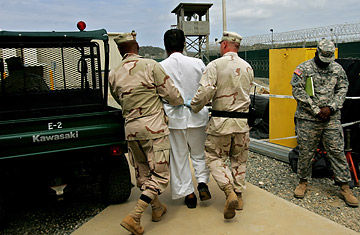
A Guantanamo detainee is escorted by U.S. military personnel on the grounds of the detention facility at Guantanamo Bay US Naval Base, Cuba.
It sounds implausible, but in the latest legal skirmish over the war on terrorism, the Bush Administration may have actually won by losing.
The U.S. Court of Appeals in Washington ruled Friday that the government must cough up just about everything it has on any Guantanamo Bay prisoner who challenges his detention before the appeals court. It's a loss for the Administration, which argued that it didn't need to share any evidence it hadn't revealed to the military tribunal that first approved the prisoner's detention. And it's a win for the prisoner, who can now appeal a tribunal's decision with the benefit of knowing the government's full case against him.
But that's thinking small. What really counts is how the ruling will affect the Supreme Court's thinking in two other detainee cases that the justices have accepted for review. And on that score, the Administration probably comes out ahead.
The issue in those cases is whether the current, bare-bones process of reviewing prisoners' detentions is fair under the Constitution, or whether the prisoners deserve the full protections of habeas corpus, the right to argue in court that they are being held illegally. Created under the 2005 Detainee Treatment Act, the current process provides for a hearing before a Combatant Status Review Tribunal, a bunch of military officers who listen to testimony from only the government's lawyers. The prisoner can then appeal the tribunal's decision to the D.C. appeals court, which decides only whether the tribunal properly followed its own rules.
Lawyers for detainees argue that their clients have the right to file for habeas corpus, no matter what the 2005 act says. The D.C. appeals court ruled earlier this year in two cases that Congress took that right away, and those are the cases that the Supreme Court has accepted for review.
The justices have to decide essentially two issues: whether the detainees get habeas, and in any event, whether the current process is fair. It's on the latter question that Friday's decision helps the Administration. We know the justices are interested in that decision, because they've asked for briefs on how it affects the two detainee cases before the court. From one point of view, the current process looks a heck of a lot fairer to Guantanamo prisoners now that their lawyers can see virtually all the government's evidence. No one knows what the justices will do, but you can imagine them saying, well, these guys are suspicious characters to begin with, and so long as the appeals court can take a look at everything the government has on them, we're confident that they'll get a fair shake.
There's still a chance the justices could decide that, even with fuller disclosure required of the Administration, the process still falls short. That's the argument not only of the detainees' lawyers, but also of one of the three judges on the panel that issued Friday's decision. In an opinion concurring with the ruling, Judge Judith Rogers warned that the evidence the court sees "will only be a partial record," because detainees are still not allowed to rebut the evidence against them or to present their own evidence at the tribunals.
An even greater concern for her, the defense lawyers and, potentially, the Supreme Court is the mounting evidence that the military tribunals are fundamentally flawed. For example, Stephen Abraham, a lawyer and Army reserve intelligence officer assigned to help run the Guantanamo hearings, filed an affidavit in June with the Supreme Court disclosing that the tribunals relied on the flimsiest of evidence to judge whether detainees were properly held. Rogers called the affidavit "unsettling."
For now, though, the Administration should consider itself lucky. Despite having overreached in its arguments to the appeals court, the judges gave it ammunition for the high-court battles to come.
